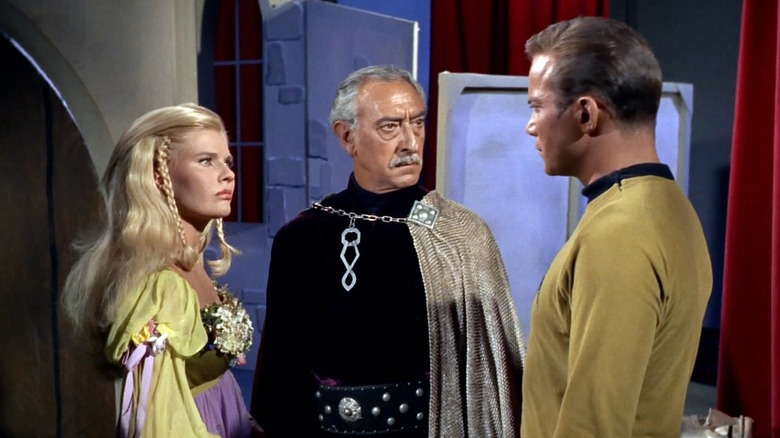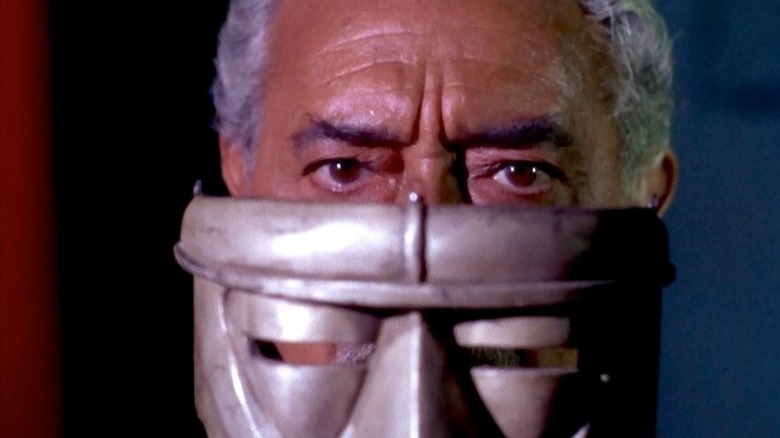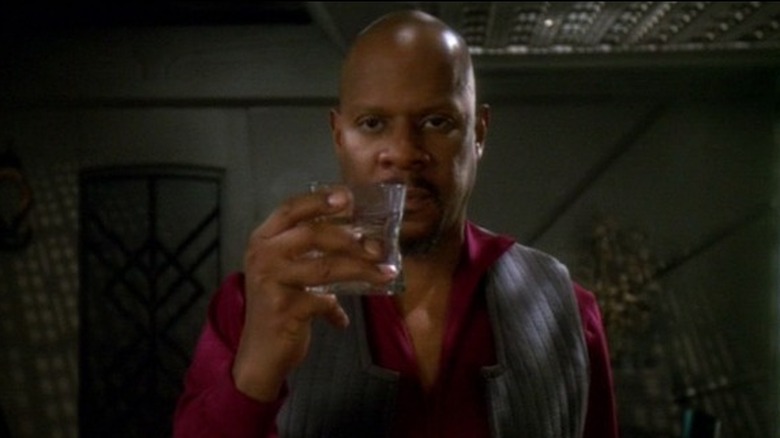Veteran Star Trek Writer Ronald D. Moore Named His Favorite Episode - And It's A Shakespearean Classic
Ronald D. Moore is one of the most accomplished "Star Trek" writers of the "Next Generation" era. His subsequent work creating "Battlestar Galactica" (telling stories he couldn't on "Star Trek") and "For All Mankind" cement him as a king of science-fiction television writing.
While he writes in the science-fiction space, Moore prioritizes human drama over high concepts. He writes not with embarrassment towards his chosen genre but conviction that your audience will care most when your characters experience familiar struggles even if they walk around in unfamiliar settings.
So, it makes total sense that Moore has consistently called "The Conscience of the King" one of his favorite "Star Trek" episodes ever. It's a brilliant episode that kickstarts the tradition of intertwining "Star Trek" and Shakespeare. The episode title is a "Hamlet" quote, and the episode's guest players are a Shakespearean theater troupe.
Written by Barry Trivers (his only produced "Star Trek" script), "The Conscience of the King" is the 13th episode of "Star Trek" ever aired (on December 8, 1966). This might account for the episode not feeling specifically sci-fi; the show was still finding its pace about what stories to tell. The Enterprise picking up a group of actors is a story device right out of a Western (see John Ford's "Stagecoach"), fitting creator Gene Roddenberry's elevator pitch of "a wagon train to the stars."
But the troupe's leader, Anton Karidian (Arnold Moss), may be playing a part offstage as well; his identity is the episode's central mystery, and one that indeed gnaws at the conscience of Captain Kirk (William Shatner).
What happens in Star Trek's The Conscience of the King?
"The Conscience of the King" opens with the Enterprise docked at Federation colony "Planet Q" (no relation). Kirk's old friend Tom Leighton (William Sargent) has called him to watch a performance by the visiting Karidian Players — because Leighton suspects Kardian is actually Kodos, former governor of the Tarsus IV colony where Leighton and Kirk once lived. When famine hit the planet, Kodos had half of the colony's population of 8,000 executed to save the other half. Then supply ships arrived soon after, turning the mass execution from a desperate act of evil into an unnecessary one. Kodos is presumed dead, but if he isn't, Kirk and Leighton are two of the only remaining souls who can identify him and testify to his crimes.
Kirk is skeptical — until Leighton is found murdered. So, he invites the Karidian Players to travel to their next destination aboard the Enterprise, using the chance to investigate if their leader really is Kodos the Executioner. Here's another clever way the episode works in Shakespeare: Karidian is introduced playing Macbeth, a man who murders his innocent king and friend, is consumed by guilt, and then becomes a tyrant. Does the role mirror Karidian's past life?
Normally I don't hesitate to spoil decades old stories, including 58-year old TV episodes, but I'll make an exception here. The uncertainty is what makes "The Conscience of the King" a powerful watch, because the episode forces you to wrestle with those feelings as Kirk does too. By pursuing Karidian even as he's unsure of his identity, is Kirk capturing a monster or condemning an innocent man? Even if Karidian is Kodos, is Kirk performing an act of justice, to soothe the souls of Kodos' victim, or of vengeance, to hurt Kodos like the executioner hurt him?
In my book, this dilemma rivals Khan Noonien Singh as one of the greatest challenges in James T. Kirk's long career.
Star Trek's Conscience of the King leads to DS9's In The Pale Moonlight
Which Moore-penned "Star Trek" episode most shows his love for "The Conscience of the King"? I'd say it's "In The Pale Moonlight" from "Deep Space Nine." (Moore did uncredited rewrites for the late Peter Allan Fields.) The episodes forces Captain Ben Sisko (Avery Books), who've we called the best "Trek" captain, to face a dilemma outstripping even Kirk's.
"In The Pale Moonlight" is set knee-deep in the Dominion War, and the Federation is losing. So Sisko, conspiring with the former spy and current tailor Garak (Andrew Robinson), works to bring the Romulans into the war under false pretenses. Some bribery, forgery, and eventually a few murders later, it works, but Sisko is left to wonder if his conscience was too high a price to save the world.
The episode uses a framing device where Sisko is recording a data log about the episode's events. Dramatically, it functions as a Shakespearean soliloquy (a character monologuing and asking questions to themself, and by extension the audience). Take this "Macbeth" passage where our lead tempers compulsion to murder King Duncan and claim his throne:
"Is this a dagger which I see before me, the handle toward my hand? Come, let me clutch thee. I have thee not, and yet I see thee still. Art thou not, fatal vision, sensible to feeling as to sight? Or art thou but a dagger of the mind, a false creation, proceeding from the heat-oppressed brain?"
Brooks, a stage actor first and foremost, feels at home in these moments, especially the ending. In a particularly theatrical moment, Sisko stares straight ahead and decides "I can live with it" — because he's going to have to. Kirk was wrestling with how to act, while Sisko had to accept what he'd already done.
I don't know if Peter Allan Fields shared Moore's love for "The Conscience of the King," but one of his earlier episodes suggests he might've. Season 1's "Duet" focuses on Major Kira Nerys (Nana Visitor). Kira is a Bajoran, a people who endured a brutal occupation by the neighboring Cardassians, and Kira was active in rebel cells during this occupation.
"Duet" features a Cardassian named Marritza (Harris Yulin) arriving on Deep Space Nine. Kira suspects that he is actually the war criminal Gul Darhe'el, who ran the Gallitep concentration camp during the Cardassian occupation and oversaw countless atrocities. Both "Duet" and "The Conscience of the King" are mysteries where the lead must confront a horrible part of their past and come face to face with, possibly, the individual responsible. While Kirk is unsure of how to act or what to believe, Kira wants Marritza to be the monster she thinks he is; the Cardassians must be punished and he'll do as well as the next.
It's episodes like these, where the characters wrestle with complicated problems and the actors playing them can give it their all, which show why "Star Trek" attracts writers of Ron Moore's caliber.


